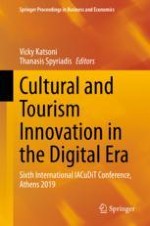2020 | OriginalPaper | Buchkapitel
Weighting the ReSCulture Questionnaire: The Impact of Rewards Systems in Hotels’ Cultural Change Processes
verfasst von : Christos Kakarougkas, Theodoros Stavrinoudis, Leonidas Maroudas
Erschienen in: Cultural and Tourism Innovation in the Digital Era
Aktivieren Sie unsere intelligente Suche, um passende Fachinhalte oder Patente zu finden.
Wählen Sie Textabschnitte aus um mit Künstlicher Intelligenz passenden Patente zu finden. powered by
Markieren Sie Textabschnitte, um KI-gestützt weitere passende Inhalte zu finden. powered by
